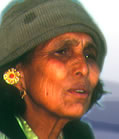 |
 |
||
 |
|||
|
RELATED THEMES agriculture community activities economics migration OTHER LOCAL THEMES BACKGROUND |
employment and income
The lack of local alternatives to farming in the hills is seen as a major problem. Several say that where once survival outside the cash economy was possible, it is no longer: "Nowadays, it seems as if cash itself is life. There is money for the picking all around us but we don't know how to accumulate it. We aren't used to amassing money. We should know how to collect it" (Nepal 23). Two narrators mention that setting up a grinding mill would provide some work in their village. One disabled man, who owns a shop, taught himself how to repair radios as a small extra source of income. One narrator describes the water mill which was worked by his father and uncle before him. Taxes have gone up and earnings fluctuate, and many others have abandoned their mills but he says, "In our case, we just can't afford to leave." Several narrators own small shops and one woman is a teacher, but clearly many villagers have to resort to finding paid employment elsewhere. As one woman (Nepal 31) asks: "For 12 months it is difficult to survive on farming alone. How to meet other expenses? Now if men had not gone out to earn, all would have remained here, becoming.dumb like sheep." Some join the army; others work as labourers or find other casual employment, often in Kathmandu but also in India and the Gulf. Several people work for Sherpas, cultivating their fields or carrying loads. Out-migration is increasing, as younger people seek work. For some poorer families, the only option for income generation has seemed to be sending daughters to work in India's urban brothels. One woman (Nepal 30) describes how she was tricked into working in one and the terrible conditions the "Madams" enforce. Poverty lies behind this employment option, she says: "All are Nepalis [in the Indian brothels]. Most of them are Tamang. from the hills." Another new interview (Nepal 24) is with a woman who left her hill village as a teenager to get work in Kathmandu's carpet factories. Her story of the exploitative conditions she endured, and her disillusionment as Nepal's economy has declined during the years of the Maoist insurgency, leaving her without job or savings, is full of detail and interest. quotes about employment and income"Now we have education, we need medicines to keep ourselves healthy. We need money every step of the way. In our fathers' time there were no schools; they did not have to send their children to school, they didn't have to pay fees. Thus, even without cash income they could manage their lives. Things now no longer work that way. Even if they are poor, right-thinking parents must educate their children, by working for daily wages if necessary." "[If people don't get enough from their own fields] they work as a daily wage labourers. If somebody is from a Chettri or Bahun family of 10-12 members, they go to work at a Sherpa's house. They will earn 40 rupees per day. A man will get that much; women will get only 25 rupees. [They] cut the firewood, carry loads form one place to another." "In the beginning, the idea was to earn some money in a year or two. to come to Kathmandu, weave carpets, go home and do as the parents say. But now.There's no work. Before one could earn around Rs 2000 to 2500 [a month]. Now it's not possible. I do feel like returning [to the hills] but I don't have a single paisa. now people will laugh if one goes back without anything, since that was the reason for coming to Kathmandu." "Earlier, on some days up to 20-25 people came [to our water mill]. This number has gone down considerably since numerous motor-driven mills were installed in the area. [They] are ten times faster.... If we get customers, if the mill is fully functional and things are done quickly, we can earn as much as 5-6 pathis a day. Otherwise, we cannot make even 1-2 pathis....This mill grinds...maize and wheat...millet, beans, and soya beans. If there are insects around, it grinds them, too!... During Father's time [the tax] was either one rupee or 5 rupees. Now we have to pay 40 rupees annually. Once they did not come for four or eight years....It is difficult to pay large sums at one time [for] poor people like us..." "If the woman cannot feed the children she will work for wages. The villagers call them, because they are poor, they know that she is in need so she will come. she will work in the fields, to plough, cultivate, irrigate and harvest. She can work in the construction of houses, carry stones and soils. They keep [the wages] for themselves and if the husband asks they say that they worked hard to earn the money and spent it on food and children." "Now all the poor people collect [medicinal plants] from the jungle and take them to the Sindhuli Dhure Bazaar so that the people from the city buy them. Since these people get money for the herbs they collect and sell [them]." "For poor people it is difficult to survive. In our family we are 10 members. The land is the same as before. We can't stretch it. That's why they are poor and they are suffering more. They work as labourers. If they have skills, they will do karmi (wood-related work). If they are educated they do service in an office. Otherwise they will do gothala (herding) and somebody will go to cut the grass and other will work as a hali (field worker)." |
|